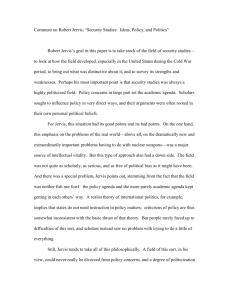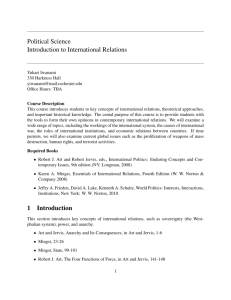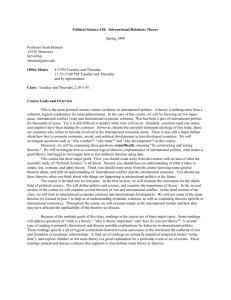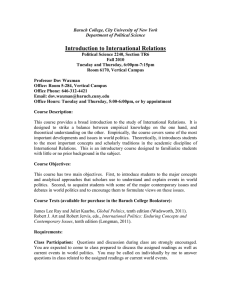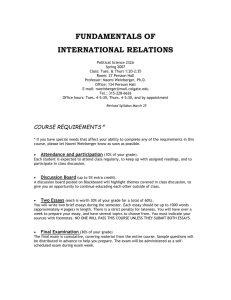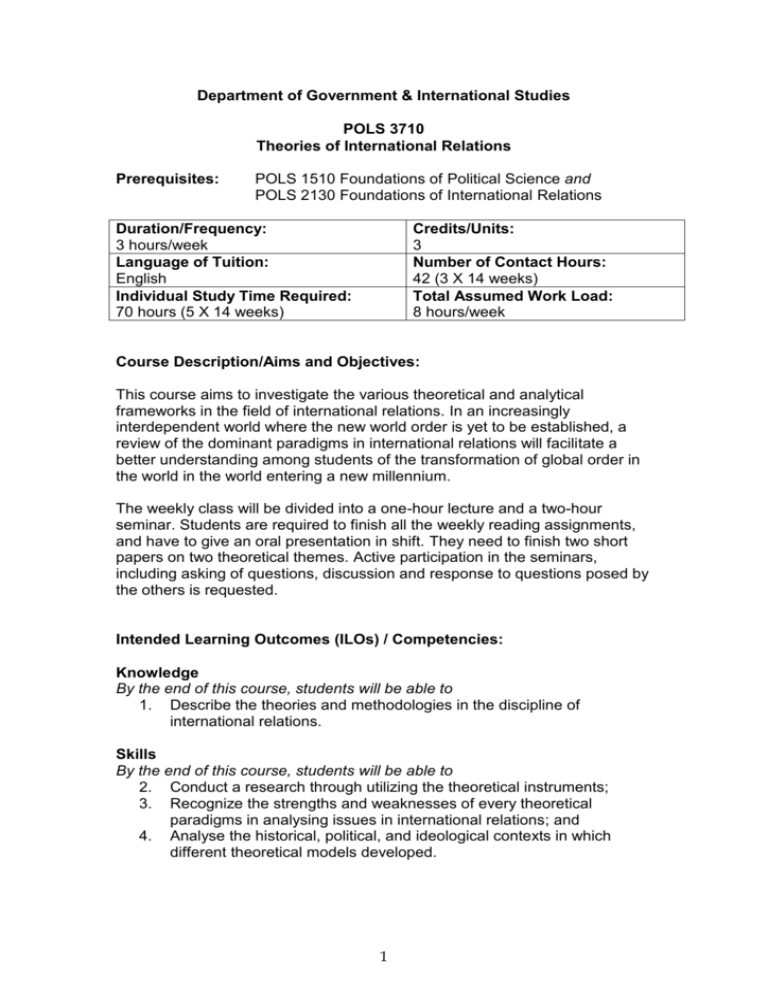
Department of Government & International Studies
POLS 3710
Theories of International Relations
Prerequisites:
POLS 1510 Foundations of Political Science and
POLS 2130 Foundations of International Relations
Duration/Frequency:
3 hours/week
Language of Tuition:
English
Individual Study Time Required:
70 hours (5 X 14 weeks)
Credits/Units:
3
Number of Contact Hours:
42 (3 X 14 weeks)
Total Assumed Work Load:
8 hours/week
Course Description/Aims and Objectives:
This course aims to investigate the various theoretical and analytical
frameworks in the field of international relations. In an increasingly
interdependent world where the new world order is yet to be established, a
review of the dominant paradigms in international relations will facilitate a
better understanding among students of the transformation of global order in
the world in the world entering a new millennium.
The weekly class will be divided into a one-hour lecture and a two-hour
seminar. Students are required to finish all the weekly reading assignments,
and have to give an oral presentation in shift. They need to finish two short
papers on two theoretical themes. Active participation in the seminars,
including asking of questions, discussion and response to questions posed by
the others is requested.
Intended Learning Outcomes (ILOs) / Competencies:
Knowledge
By the end of this course, students will be able to
1. Describe the theories and methodologies in the discipline of
international relations.
Skills
By the end of this course, students will be able to
2. Conduct a research through utilizing the theoretical instruments;
3. Recognize the strengths and weaknesses of every theoretical
paradigms in analysing issues in international relations; and
4. Analyse the historical, political, and ideological contexts in which
different theoretical models developed.
1
Attitudes
By the end of this course, students will be able to
5. Develop requisite theoretical and analytical frameworks, which will
allow them to better understand, critically evaluate and interpret, and
communicate international relations over time, and at various levels of
the international system;
6. Appraise the complexity and interconnectedness of concepts,
theories, and analytical methods of political science in general and IR
in particular; and
7. Evaluate the acquired knowledge and skills when observing the daily
developments in world politics.
Course Content:
1. Scope and nature of theories of International Relations
J. Rosenau, “Thinking theory thoroughly”, in The Scientific Study of Foreign
Policy, London: Frances Pinter, 1980, 19-31.
K. Booth, “75 years on: rewriting the subject’s past - reinventing its future”,
in S. Smith, K. Booth and M. Zalewski ed., International Theory: Positivism
and Beyond, Cambridge University Press, 1996, 333-339.
S. Smith, “The self-images of a discipline: A genealogy of international
relations theory”, in K. Booth & S. Smith, 1-37.
H. Starr, “Visions of Global Politics as an Intellectual Enterprise”, in D. J.
Puchala ed., Visions of International Relations, University of Carolina Press,
2002, 42-61
2. State, National interest and the paradigm of Realism
H. Morgenthau, “A realist theory of international politics”, in Politics
Among Nations, 5th edition, New York: Alfred Knopf, 1973, 3-15.
H. Bull, “Does order exist in world politics?” in The Anarchical Society,
London: Macmillan, 1977, 22-27, 38-52.
B. Buzan, “The timeless wisdom of realism?” in S. Smith, K. Booth &
M. Zalewski, 47-65.
R. Gilpin, “No One Loves a Political Realist”, in B. Frankel ed.,
Realism: Restatement and Renewal, London: Frank Cass, 1996, 326
2
3. Balance of Power
Crowe, “The containment of Germany”,
Kennan, “The containment of the Soviet Union”,
Morgenthau, “The balance of power as an automatic stabiliser”,
Claude, “The balance of power’s failure to secure peace”,
Wight, “Diverse meanings of the balance of power”, in E. Luard ed., Basic
Texts in International Relations, New York: St Martin’s Press, 1992, 469497.
“Balance of Power Policies” & “Balance of Power Systems” in M. Sheehan,
The Balance of Power, London: Routledge, 1996, 53-96.
S. Walt, “Alliances: Balancing and Bandwagoning”, in R. Art & R. Jervis ed.,
International Politics: Enduring Concepts and Contemporary Issues, 8th
edition, New York: Pearson Longman, 2007, 96-103.
Mark R. Brawley, “The Political Economy of Balance of Power Theory”, in T.
V. Paul, J. J. Wirtz & M. Fortmann ed., Balance of Power, Stanford
University Press, 2004, 76-99.
4. Structural Realism
K. Waltz, “The anarchic structure of world politics”, in R. Art and R. Jervis,
29-49.
A. Linklater, “Neo-realism in theory and practice”, in K. Booth & S. Smith
ed., International Relations Theory Today, Pennsylvania State University
Press, 1995, 241-261.
J. J. Mearsheimer, “Anarchy and the Struggle for Power”, in The Tragedy of
Great Power Politics, New York: W. W. Norton, 2001, 29-54
3
5. The Neo-liberal Challenge: Cooperation under Anarchy
M. Doyle, “Kant, Liberal Legacies, and Foreign Affairs”, in R. Art & R.
Jervis, 83-95.
K. Oye, “The Conditions for Cooperation in World Politics”, in R. Art & R.
Jervis, 69-82.
R. Keohane, “International Institutions: Can Interdependence Work?” in R.
Art & R. Jervis, 119-126.
R. Keohane, “Institutional theory and the realist challenge after the Cold
War”, in D. Baldwin, ed., Neorealism and Neoliberalism, New York:
Columbia University Press, 1993, 269-300.
R. Jervis, “Realism, Neoliberalism, and Cooperation”, International
Security, 24:1 (Summer 1999), 42-63.
6. International Political Economy
R. Gilpin, “The nature of Political Economy”, in R. Art & R. Jervis, 263-279
J. Frankel, “Globalization of the International Economy”, R. Art & R. Jervis,
303-318.
B. R. Scott, “The Great Divide in the Global Village”, in R. Art & R. Jervis,
290-302.
K. Waltz, “Globalization and Governance”, in R. Art & R. Jervis, 548-559.
D. Rodrik, “Trading in Illusions”, in R. Art & R. Jervis, 325-332.
J. Micklethwait & A. Wooldridge, “Why Globalization Backlash is Stupid”, in
R. Art & R. Jervis, 333-339.
7. World System
I. Wallerstein, “The inter-state structure of the modern world- system”, in S.
Smith, K. Booth, & M. Zalewski, 87-107.
I. Wallerstein, “The capitalist world-economy: middle-run prospects”,
Geopolitics and Geoculture, Cambridge University Press, 1993, 123-136.
I. Wallerstein, “Long Waves as Capitalist Process”, in The Essential
Wallerstein, New York: The New Press, 2000, 207-220.
S. Amin, “Obsolescent Capitalism and the New World Disorder”, in
Obsolescent Capitalism, New York: Zed, 2003, 92-120.
4
8. Conflict and Causes of War
P. Katzenstein, “National Security in a Changing World”, in P. Katzenstein
ed., The Culture of National Security, New York: Columbia University Press,
1996, 498-537
R. Art, “The Four Functions of force”, in R. Art & R. Jervis, 131-138.
S. Huntington, “The Clash of Civilizations?” in R. Art & R. Jervis, 395-410.
T. Schelling, “The Diplomacy of Violence”, in R. Art & R. Jervis, 139-152
C. Kaufmann, “Possible and Impossible Solutions to Ethnic Civil Wars”, in
R. Art & R. Jervis, 435-456.
Robert I. Rotberg, “Failed States, Collapsed States, Weak States: Causes
and Indicators”, in R. Art & R. Jervis, 427-434.
9. Nuclear Strategy
L. Freedman, “The first two generations of nuclear strategists”, in P. Paret
ed., Makers of Modern Strategy, Oxford:
Clarendon Press, 1986, 735-778.
S. Sagan, “Nuclear Instability in South Asia”, in R. Art & R. Jervis, 217-229.
K. Waltz, “Nuclear Stability in South Asia”, in R. Art & R. Jervis, 228-238.
10. Arms Control
“The Proliferation of Weapons of Mass Destruction”, “Arms Control”,
“ Disarmament”, in B. Buzan & E. Herring, The Arms Dynamic in World
Politics, Boulder: Lynne Rienner, 1998, 53-71, 211-229, 245-262.
Wenguang Shao, “WMD Proliferation in Asia: a Chinese Perspective”, in S.
E. Johnson & W. H. Lewis ed., Weapons of Mass Destruction: New
Perspectives on Counterproliferation, Washington, D.C.: National Defense
University Press, 1995, 133-145.
5
11. Social Constructivism
Peter Katzenstein ed., The Culture of National Identity, New York: Columbia
University Press, 1996, 1-32.
John Gerard Ruggie, Constructing the World Polity, London: Routledge,
1998, 1-39
A. Wendt, “Anarchy is What States Make of It”, in R. Art & R. Jervis, 61-68
秦亞青, “國際政治的社會結構”, 歐洲,19:3,2001年3月,4-11。
12. The End of Cold War and the New World Order
J. L. Gaddis, “International relations and the end of Cold War”, S. M. LynnJones & S. E. Miller ed., The Cold War and After: Prospects for Peace,
Cambridge, Mass.: MIT Press, 1994, 323-388.
R. Jervis, “The Era of Leading Power Peace”, in R. Art & R. Jervis, 379394.
G. J. Ikenberry, “Rising Powers and Global Institutions”, in R, Art & R.
Jervis, 560-566.
Anne-Marie Slaughter, “Government Networks and Global Governance”, in
R, Art & R. Jervis, 577-586.
B. Russett, “Bushwhacking the Democratic Peace”, International Studies
Perspectives, 6:4 (November 2005), 395-408
13. International Relations Theories in China
王逸舟,“面向未來的中國國際關係理論研究”,東亞季刊, 30:2,1999年
春季, 111-124。
王逸舟,“中國大陸國際關係理論研究的若干問題”,東亞季刊, 30:3,
1999年夏季, 71-90。
Teaching & Learning Activities (TLAs):
TLAs
1. Lectures
The lectures will examine the various theoretical and analytical
6
ILOs
addressed
1 to 7
frameworks in the field of international relations.
2. Tutorial discussions/ Presentations
Tutorial sessions will be held to discuss the complexity and
interconnectedness of concepts, theories, and analytical
methods of political science in general and IR in particular.
2 to 7
Assessment Methods (AMs):
AMs
Weighting
Papers
40%
ILOs
addressed
1 to 4, 7
Seminar Participation
20%
1 to 7
Examination
40%
1 to 4, 7
Textbook:
Description of
Assessment Tasks
Students need to
finish two short
papers on two
theoretical themes.
Active participation
in the seminars,
including asking of
questions,
discussion and
response to
questions posed by
the others is
requested.
The questions will be
essay-type questions
testing students’
understanding of the
complexity and
interconnectedness
of concepts,
theories, and
analytical methods
of political science in
general and IR in
particular.
R. Art and R. Jervis, International Politics: Enduring Concepts
and Contemporary Issues, 9th ed., New York: Pearson
Longman, 2009.
7
References:
*Chinese translations available
Amin, S., Obsolescent Capitalism, New York: Zed, 2003
Aron, R., Peace and War: A Theory of International Relations, Melbourne, Fl:
Frieger, 1981.
Baldwin, D., Neorealism and Neoliberalism, New York: Columbia University Press,
1993.
Banks, M. and M. Shaw, eds., State and Society in International Relations , New
York: St. Martin’s Press, 1991.
Bobbit, P., The Shield of Achilles: War, Peace, and the Course of History, New
York: Knopf, 2002.
Booth, K. & Smith, S. ed., International Relations Theory Today, Pennsylvania
State University Press, 1995.
Brown, M. E et al. ed., Theories of War and Peace, Cambridge, Mass.: MIT Press,
1998.
*Bull, H., The Anarchical Society, London: Macmillan, 1977.
Buzan, B., C.A. Jones, and R. Little, The Logic of Anarchy: Neorealism to
Structural Realism, New York: Columbia University Press, 1993.
*Buzan, B. and Herring E., The Arms Dynamic in World Politics, Boulder,
Colorado: Lynne Rienner, 1998.
*Buzan, B. and Little, R., International Systems in World History: Remaking the
Study of International Relations, Oxford University Press, 2000.
Buzan, B, From International to World Society? English School Theory and the
Social Structure of Globalization, Cambridge University Press, 2004.
*Deutsch, K. W., The Analysis of International Relations, New York: Prentice-Hall,
1988.
*Dougherty, J.E. and R.L. Pfaltzgraff, Jr., Contending Theories of International
Relations, New York: Harper and Row, 1990.
*Finnemore, M., National Interests in International Society, Ithaca, N. Y.: Cornell
University Press, 1996.
Frankel, B. ed., Realism: Restatements and Renewal, London: Frank Cass, 1996.
*Freedman, L., The Evolution of Nuclear Strategy, London: Macmillan, 1989.
Fukuyama, F., The End of History and the Last Man, London: Harrish Hamilton,
1992.
*Gilpin, R., The Political Economy of International Relations, Princeton University
Press, 1987.
*Gilpin, R., The Challenge of Global Capitalism, the World Economy in the 21st
Century, Princeton University Press, 2000.
*Gilpin, R., Global Political Economy: Understanding the International Economic
Order, Princeton University Press, 2001.
Goldstein, J. & Keohane, R. O. ed., Ideas and Foreign Policy, Ithaca, N. Y.:
Cornell University Press, 1993
Groom, A.J.R. and M. Light, eds., Contemporary International Relations: A
Guide to Theory , London: Pinter, 1994.
Guzzini, S & Leander, A. ed., Constructivism and International Relations:
Alexander Wendt and his Critics, London: Routledge, 2006.
*Hoffmann, S., Contemporary Theory in International Relations:, Connecticut:
Greenwood Press, 1977.
Holsti, K.J., International Politics: A Framework for Analysis , Englewood Cliffs:
Prentice-Hall, 1992.
8
Jackson, R. ed., Sovereignty at the Millennium, Oxford: Blackwell, 1999.
*Jervis, R., Perception and Misperception in International Politics, Princeton
University Press, 1976.
Johnson, S. E. & Lewis, W. H. ed., Weapons of Mass Destruction: New
Perspectives on Counterproliferation, Washington D. C.: National Defense
University Press, 1995.
Katzenstein, P. J. ed., The Culture of National Identity, New York: Columbia
University Press, 1996.
*Kennedy, P., The Rise and Fall of the Great Powers , London: Fontana, 1988.
*Keohane, R. & Nye, J., Power and Interdependence: World Politics in Transition,
Boston: Little, Brown & Co., 1977.
Krasner, S. D., Sovereignty: Organized Hypocrisy, Princeton University Press,
1999
Lebow, R. N. & Risse-Kappen ed., International Relations theory and the End of
Cold War, New York: Columbia University Press, 1995.
Luard, E. ed., Basic Texts in International Relations, New York: St Martin’s
Press, 1992.
Lynn-Jones, S. M. & Miller, S. E. ed., The Cold War and after: Prospects for
Peace , Cambridge, Mass.: MIT Press, 1994.
*Mearsheimer J. J., The Tragedy of Great Power Politics, W. W. Norton, 2001.
Modelski, G., Long Cycles in World Politics , London: Macmillan, 1987.
*Morgenthau, H., Politics Among Nations, New York: A. Knopf, 1973.
*Nye, J. S. Jr. & J. Donahue ed, Governance in a Globalizing World. Washington
D. C.: Brookings, 2000.
*Nye, J. S. Jr., The Paradox of American Power, New York: Oxford University
Press, 2002.
Nye, J. S. Jr., Soft Power: the Means to Success in World Politics, New York:
Public Affairs, 2004
Nye, J. S. Jr., Power in the Global Information Age: from Realism to Globalization,
London: Routledge, 2004.
Paret, P. ed., Makers of Modern Strategy, Oxford: Clarendon Press, 1986.
Paul, T. V., Wirtz , J. J. & Fortmann M. ed., Balance of Power, Stanford University
Press, 2004.
Puchala, D. J. ed., Visions of International Relations, University of South Carolina
Press, 2002.
Rosenau, J., The Scientific Study of Foreign Policy, London: Frances Pinter, 1980.
Rosenau, J., Turbulence in World Politics: A Theory of Change and Continuity,
New York: Harvester Wheatsheaf, 1990.
Ruggie, J. G., Constructing the World Polity, London: Routledge, 1998
Seabury, P. & Codevilla, A., War: Ends and Means, New York: Basic Books, 1989.
Sheehan, M., The Balance of Power, London: Routledge, 1996.
Smith, S., Booth., K., & Zalewski. M. ed., International Theory: Positivism and
Beyond, Cambridge University Press, 1996.
Viotti, P. R. & Kauppi, M. V., International Relations Theory: Realism, Pluralism,
Globalism, New York: Macmillan, 1993.
Wallerstein, I., The Capitalist World Economy, Cambridge University Press, 1979.
Wallerstein, I., The Essential Wallerstein, New York: The New Press, 2000.
Wallerstein, I., Geopolitics and Geoculture, Cambridge University Press, 1993.
*Waltz, K., Man, the State and War, New York: Columbia University Press, 1959.
*Waltz, K., Theory of International Politics, New York: McGraw-Hill, 1979.
9
Watson, A., The Evolution of International Society: A Comparative Historical
Analysis , London: Routledge, 1992.
*Wendt, A., Social Theory of International Politics, Cambridge University Press,
1999
*Wight, M., Power Politics, Middlesex, UK: Penguin, 1978.
Syllabus prepared by: Prof. Wai TING / September 2010
10

